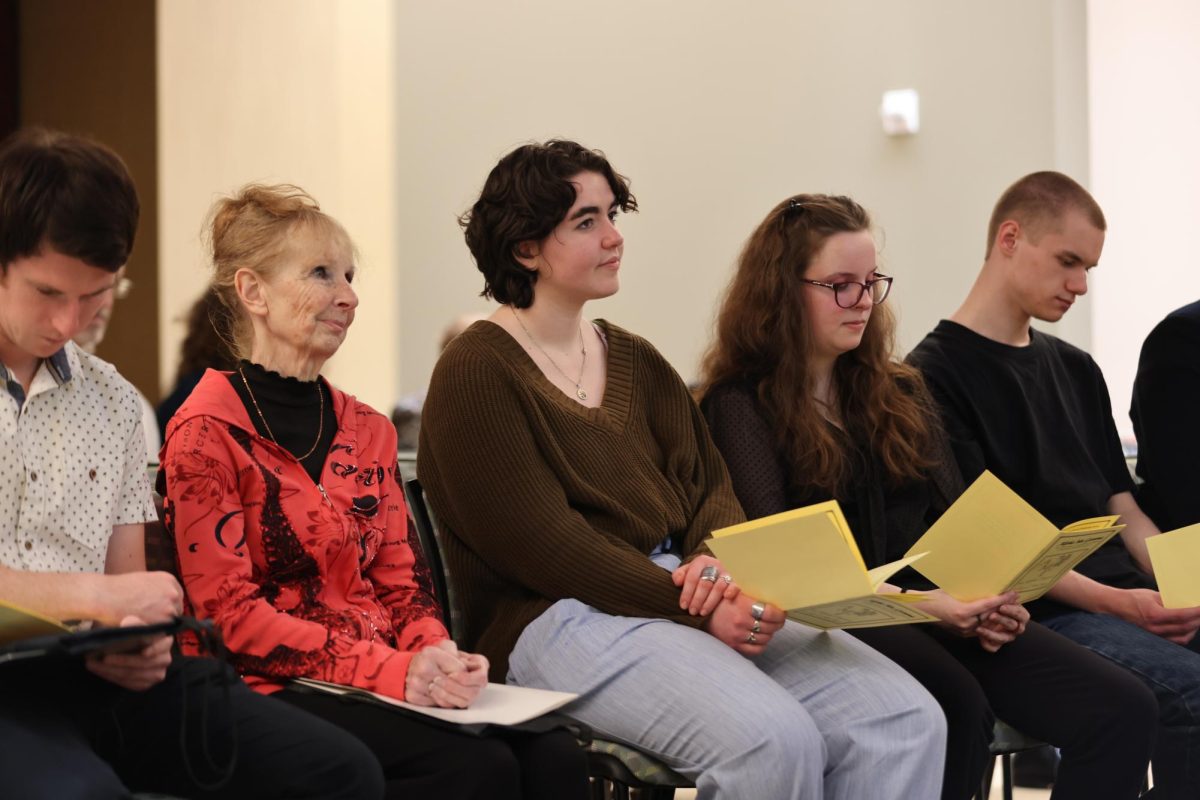Following a successful and empowering Barbie Summer, this fall will see another blonde icon taking the movie scene by storm through innovative methods. Last month, in an announcement that sparked relief for theaters but concern for major studios, Taylor Swift revealed that her concert film Taylor Swift: the Eras Tour will be coming to the big screen on Oct. 13. The announcement came in the form of an Instagram post on Swift’s account on Aug. 31.
“The Eras Tour has been the most meaningful, electric experience of my life so far, and I’m overjoyed to tell you that it’ll be coming to the big screen soon,” the post read. “Starting Oct. 13 you’ll be able to experience the concert film in theaters in North America! Tickets are on sale now at http://taylor.lnk.to/TSTheErasTourFilm…,” Swift captioned the reveal on her social media. “Eras attire, friendship bracelets, singing and dancing encouraged 1, 2, 3 LGB!!!! (iykyk)”
The announcement, which also contained an 80-second trailer, came as great news for fans unable to witness the 12-time Grammy winner perform live this year. As many disappointed fans are aware, she has since moved on to the international leg of her tour, though she will be back in October 2024 to do three shows in Miami, three in New Orleans, three in Indianapolis and six in Toronto.
According to AMC Theatres, the “Eras Tour” concert movie is a slightly condensed version of a live performance, providing fans with an affordable and accessible opportunity to experience both the show tour and the communal atmosphere of her concert. Reportedly, Swift is releasing the film in theaters rather than directly to streaming platforms, as was done with her previous movies, to encourage fans to experience the tour together, bringing the electric and friendly energy of her concerts (and friendship bracelet trading) to fan’s hometowns.
Fans in the United States can purchase tickets for the “Eras Tour” concert film through AMC, Regal, Cinemark or Fandango, as shared by Swift on X. AMC has reported there will be at least four sessions per day on Thursdays, Fridays, Saturdays and Sundays nationwide, although there have been no announcements yet regarding possible international showings or future streaming releases. Devoted fans may also notice the Easter Eggs hidden in the ticket prices, with adult tickets priced at $19.89 and children’s tickets at $13.13, which are playful nods to her soon-to-be-released album 1989 and her favorite number 13, as well as her birthday, Dec. 13, 1989.
Industry experts predict the film will generate an estimated $400 million in ticket sales alone, not to mention the additional profits that will be made in concessions and merchandise from the thousands of fans expected to flood theaters in the upcoming month. Overall, Sony Pictures Entertainment predicts the film may gross over $200 million domestically, making it one of the highest-grossing films of the year.
This will provide a much-needed boost to theaters, many of which are still struggling due to COVID-19 and the lack of media being produced or released in the wake of the SAG-AFTRA strike. CNBC reports that, “Since 2019, the number of total screens in the U.S. have decreased by around 3,000 to just under 40,000,” and claim that this rapid decline, “was a direct result of the Covid pandemic, which shut down theaters for a time and triggered a surge in streaming subscriptions. A number of regional chains have shuttered for good, while others were left to reevaluate their financial footing. For many, that meant closing locations or selling off leases.”
Reportedly, ticket sales are still down by 21% since 2019, and though 2023 box office sales have seen marked improvement from 2022 (sales up by 50% according to data from Comscore as quoted by CNBC), there is still cause for concern. Theaters were counting on the revenue they would reap from a strong second half of the year that will no longer be realized with the delay of blockbuster films such as “Dune 2,” and are forced to find innovative alternatives to boost their margins.
However, the early box-office success of Swift’s film suggests that their unconventional efforts may already be paying off. Many theaters already have presale tickets available for the first showings, and it wasn’t long before Swift shattered records, surpassing “Spider-Man: No Way Home” for the biggest pre-sale numbers in AMC history within the first three hours.
On AMC’s platform alone, the concert film has generated an astounding $26 million on its first day of pre-sales, surpassing Marvel’s blockbuster by nearly $10 million. Across all ticket-selling platforms, the film has amassed a total of $37 million in a single day. However, those seeking to purchase tickets online should anticipate waiting patiently in a queue and experiencing delays, wait times and outages. AMC has acknowledged in a statement on its website that, despite updating its website to avoid a TicketMaster-like debacle, “No ticketing system in history seems to have been able to accommodate the soaring demand from Taylor Swift fans when tickets are first placed on sale.”
Fans may be curious to know how Swift was able to produce and promote her movie during the strike. The explanation for this feat is simple; Swift was able to break the stalemate of the strike by striking an interim agreement with SAG-AFTRA, the actors’ union of which she is a member, by acquiescing to workers’ demands. Swift accepted the union’s last studio offers, which included improved streaming residuals, increased pay, and more frequent breaks.
If Swift’s announcement caught you off guard, you aren’t alone; it caught both studios and exhibitors off guard as well. Theaters made direct deals with Swift, thereby cutting major movie studios out of the loop entirely.
Many major studios are already grappling with the repercussions of this announcement, as they are forced to consider what it means for the future of the music industry and their fall movie rosters. With the sudden realization that multiple movies were set for release on or around the concert film’s debut date of Oct. 13, 2023, many major studios are now scrambling to reconfigure their schedules.
Less than 24 hours after Swift’s announcement, Jason Blum, director of Universal’s “Exorcist: Believer,” posted a statement on X that his horror sequel would be moving from Oct. 13— an otherwise optimal release date for any scary movie since it would be Friday the 13— to Oct. 6 instead. Similarly, Meg Ryan’s return from her fourteen-year roc-com hiatus has also been delayed, and fans will now have to wait until Nov. 3 to see her star in Bleecker Street’s “What Happens Later.”
Additionally, this unusual arrangement poses concerns for studios because the theater chain and the distributor traditionally split box office receipts. According to Billboard, an inside source told Puck news that Swift’s decision to deviate from a traditional production process for her film, “sends a clear message from exhibitors to traditional studios that multiplexes can find programming without their help, potentially changing the dynamics of cinema distribution.”
The non-studio distribution of the highly anticipated movie establishes a precedent for the possibility of studios’ eventual elimination from the financial picture for blockbuster movies with large box office receipts. However, since the studios have shown themselves to be less than dependable partners in supplying a continuous flow of multiplex-friendly releases, movie theaters are now searching for alternatives to traditional films. Michael O’Leary, CEO of the National Association of Theatre Owners spoke to the Theater Industry’s hope that Swift’s film will revive the concert film genre.
“Concert films have seen outstanding results over the years, and now based on massive pre-sales across the country, it’s clear that ‘The Eras Tour’ will break new ground for the genre,” O’Leary said in an interview given to CNBC, “We hope this will lead to even more concert films in theaters in the years to come.”







